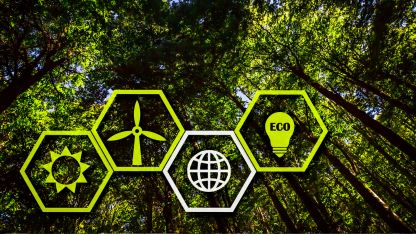

The energy transition in Indonesia is a shift from dependence on fossil fuel sources (such as petroleum and coal) to more sustainable and environmentally friendly energy sources, such as renewable energy (solar, wind, water, biomass) and nuclear energy with the aim of achieving Net Zero Emission by using clean energy sources.
There are three things that support the energy transition, namely access, technology and funding. Switching from fossil fuels to renewable energy is an important step and making renewable energy the norm is neither technological nor costly.
This energy transition is a response to various environmental problems, including climate change, as well as efforts to reduce dependence on imported fossil fuels and increase energy security and realize a green economy in Indonesia.
The energy transition also shows Indonesia's commitment to expanding access to affordable and clean technology to encourage a sustainable and greener economic recovery.
Indonesia has set a new and renewable energy (EBT) target of 23% of total national energy by 2025. This policy, coupled with Indonesia's commitment to reduce emissions by 29% by 2030, is a concrete step towards a cleaner and more sustainable energy system.
However, in reality, the development of new and renewable energy (EBT) in Indonesia is very slow. Until 2019, the role of new and renewable energy (EBT) was only 9.15% of total national energy consumption. This is caused by various factors, including the gap between policies and regulations in Indonesia.
Indonesia has great potential for the development of renewable energy. Indonesia is known to have all the potential for renewable energy, such as solar, water, wind, geothermal and biomass energy. Indonesia's geographic condition is close to the equator, making the potential for solar energy high, reaching 50% of all new and renewable energy.
In supporting the acceleration of the energy transition in Indonesia, the Government has issued Presidential Regulation no. 5/2006 concerning National Energy Policy, Law no. 30/2007 concerning Energy, Law no. 15/1985 concerning electricity, PP no. 10/1989 as amended by PP No. 03/2005 concerning Amendments to Government Regulation no. 10 of 1989 concerning the Supply and Utilization of Electric Power, Minister of Energy and Mineral Resources Regulation No. 002/2006 concerning the Business of Medium Scale Renewable Energy Power Plants, and Minister of Energy and Mineral Resources Decree No. 1122K/30/MEM/2002 concerning distributed Small Scale Power Plants.
Currently the RPP for new and renewable energy (EBT) is in the drafting stage which contains provisions regarding the obligation to provide and utilize new and renewable energy as well as providing facilities and incentives.
Carrying out an energy transition is not an easy thing to do, but preserving the earth and living creatures requires commitment and real work from all parties. With the energy transition, it is hoped that Indonesia will have the opportunity to achieve the Net Zero Emission target.
We are currently in the process of documenting energy supply practices from various parties through efforts that have been built for sustainability, justice and energy independence.***